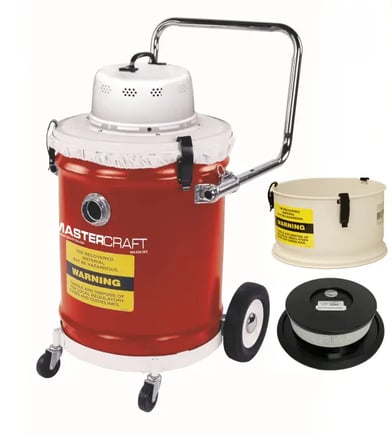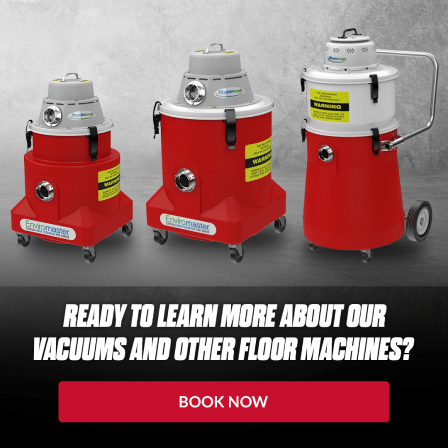Maintaining Your Commercial Floor Vacuum: Tips for Longevity and Performance
A good-quality commercial floor vacuum is an essential tool for commercial cleaners. Businesses are constantly under public scrutiny and judged by their standard of cleanliness. They need a reliable company to rely on, and reliable companies need reliable machines.
But it doesn't start and stop with what commercial vacuum you choose- it's also about how you maintain it. Like any high-performing tool, they require regular care and maintenance to ensure they stay in top condition.
By the end of this blog, you’ll not only know how to properly care for your vacuum but also why investing in professional-grade machines, such as commercial upright vacuums from Mastercraft, can make your cleaning processes more efficient and cost-effective.
Choosing the Right Commercial Vacuum
Choosing the right commercial vacuum cleaner can be a daunting task, especially with the numerous options available in the market. To make an informed decision, consider the following factors:
- Floor Types: Different commercial vacuums are designed to handle specific floor types, such as carpets, hardwood, tile, or a combination of these. Ensure the vacuum you choose is suitable for your floor type and is built for deep cleaning.
- Indoor Air Quality: If indoor air quality is a concern, look for vacuums with HEPA filtration, that are lightweight or CRI Gold-certified models (Carpet and Rug Institute). These vacuums can capture fine particles and allergens, improving the air quality in your commercial space with exceptional cleaning.
- Operator Comfort: Consider the weight, ergonomics, and noise level of the vacuum to ensure operator comfort and reduce fatigue. A machine that’s quiet, lightweight, and easy to maneuver can significantly enhance productivity and efficiency.
- Cost: Evaluate the cost of the vacuum, including the initial purchase price, maintenance, and replacement parts. While it might be tempting to go for a cheaper option, investing in a high-quality machine can save you money in the long run.
- Machine Productivity: Assess the vacuum’s productivity and efficiency, including its suction power, cleaning path, and ability to handle hard-to-reach areas. A more efficient machine can reduce cleaning time and improve overall performance.
By considering these factors, you can select a commercial vacuum that meets your specific needs and ensures optimal cleaning results.

Why Maintenance Matters for Commercial Vacuum Cleaners
Commercial floor vacuums for businesses aren’t like the vacuums you use at home. These machines are designed for rigorous use—handling everything from large debris to fine dust particles day after day. Without regular maintenance, even the highest quality vacuum cleaners will gradually lose suction power, operate inefficiently, or wear out prematurely.
Taking proactive steps to maintain your vacuum offers several benefits, including:
- Optimal Performance: Regular upkeep prevents loss of suction, clogged filters, and motor damage.
- Cost-Efficiency: Consistent maintenance reduces the likelihood of breakdowns and expensive repairs or replacements.
- Extended Lifespan: Proper care allows your machine to last as long as possible, saving you money over time.
- Better Cleaning Results: A well-maintained vacuum performs better, ensuring cleaner floors and improved customer satisfaction.
Now that we’ve covered the “why,” let’s move on to the “how.”
9 Essential Tips to Maintain Your Commercial Floor Vacuum
1. Empty the Dustbag or Bin Regularly
While it can be tempting to wait until your vacuum’s dust compartment is completely full, this can lead to reduced suction power and stress on the motor. Backpack vacuums, with their lightweight and ergonomic design, help reduce operator fatigue while maintaining powerful suction for effective cleaning.
How often should I empty the dustbag or bin?
It depends on the frequency and intensity of use, but as a general rule, it’s best practice to empty the bag or bin when it is around 2/3 full. This ensures your vacuum maintains optimal suction power while avoiding overloading the motor.
Pro Tip: For professional settings, consider HEPA filter dustbags to improve air quality and trap fine particles efficiently.
2. Check and Clean Filters Frequently
Filters play a crucial role in trapping small dust particles and allergens that can be harmful to you and your client’s health. To keep them functioning well, check the filters regularly for debris buildup and clean or replace them as needed. Clogged filters not only reduce suction power but can also damage your vacuum’s motor over time.
How often should I clean or replace filters?
The frequency will depend on the vacuum type and usage. Some manufacturers recommend cleaning or replacing the filter at least once a month, while others suggest every six months. Check your machine’s manual for specific guidelines, and always keep spare filters on hand to avoid any downtime.
- Washable Filters: If your vacuum uses these, rinse them with warm water and allow them to air dry completely before reinserting.
- Non-Washable Filters: Replace them every 3–6 months, depending on usage.
Did you know? HEPA filters, like those on Mastercraft's HEPA vacuums, capture microscopic particles, making them perfect for high-dust environments such as construction sites and healthcare facilities.
3. Inspect Brushes and Belts Regularly
Commercial vacuum cleaners are essential tools in maintaining cleanliness and air quality in various settings, including hospitals and businesses. Brushes and belts are critical components of a commercial floor vacuum that can wear out quickly due to heavy use. Regularly inspect them for signs of wear or damage, such as frayed bristles or cracked belts, and replace them as needed. Ignoring these warning signs can lead to poor performance and costly repairs or replacements.
How do I do this?
Follow your vacuum’s user manual for instructions on how to access and inspect the brushes and belts. While doing so, also check for any debris buildup that may be affecting their effectiveness.
Pro Tip: Keep spare brushes and belts on hand so you can replace them immediately if needed.
4. Keep the Exterior of Your Vacuum Clean
It’s not just the internal components that need attention—regular cleaning of the exterior is also crucial. Dirt, dust, and grime can build up on the outside of your vacuum, diminishing its appearance and compromising performance over time. Wipe down all surfaces with a damp cloth regularly to keep your machine looking clean and professional while ensuring it operates at peak efficiency.
What should I use to clean the exterior?
A mild detergent or all-purpose cleaner will do the trick. Avoid using harsh chemicals that can damage plastic or metal surfaces.
5. Store Your Vacuum Properly
When not in use, businesses should make sure to store their vacuum in a clean, dry area where it won’t be exposed to extreme temperatures or humidity. This will prevent damage and extend its lifespan. For corded vacuums, carefully wrap the cord around the machine without kinks or knots and secure it in place with velcro straps or ties. Proper storage also means keeping your vacuum out of reach of children and pets for their safety and the longevity of the machine.
What are some other good practices for storing my vacuum?
- Empty the Dustbag or Bin: Don’t store your vacuum with a full dust compartment, as this can attract pests and cause odors.
- Inspect the Vacuum’s Wheels: If your machine has wheels, make sure they are clean and free of debris before storing them to prevent damage.

6. Schedule Regular Maintenance Checks
In addition to following these maintenance tips yourself, it’s also essential to have your commercial floor vacuum professionally serviced at least once or twice a year. A qualified technician can inspect the internal components and perform any necessary repairs or replacements, ensuring your machine operates reliably for years to come.
How do I find a qualified technician for my vacuum?
Check with the manufacturer, or your distributor, or ask for recommendations from other business owners in your area. It’s also helpful to read online reviews and ratings before making a decision.
7. Train Your Employees on Proper Vacuum Use and Maintenance
One of the most crucial steps in maintaining your commercial vacuum cleaners is ensuring your employees are using them correctly and taking care of them properly. Be sure to train them on best practices for daily usage and regular maintenance tasks, such as emptying the dust compartment, cleaning filters, and inspecting brushes and belts. Additionally, make sure they know who to contact if any issues arise with the machine. Investing time in proper training can save you money on repairs and replacements in the long run.
Pro Tip: Create a maintenance schedule or checklist for your employees to follow, and regularly review it with them to reinforce good habits.
8. Check the Power Cord for Damage
The power cord is another essential component that undergoes a lot of wear and tear in commercial settings. Regularly check the cord for any damage or exposed wires, which can pose safety hazards and affect your vacuum’s performance. If you notice any issues, get it repaired by a professional before using it again.
How often should I inspect the power cord?
Ideally, check the cord after each use to ensure it is free from damage and hasn’t been damaged during cleaning. Also, be sure to inspect the cord before and after storing the vacuum.
9. Perform Monthly Maintenance Checks
Set aside 10 minutes every month to give your vacuum a detailed inspection. Focus on identifying issues like loose screws, damaged seals, or unusual noises during operation. Being proactive about these small issues can help prevent more significant damage in the long term.
Regular checks are especially important for industrial vacuum cleaners to ensure they maintain their high performance and durability.
What should I look for during a monthly maintenance check?
- Suction Power: Check that the suction power is still strong and consistent. If it seems to have decreased, it may be time to replace filters or clean the dust compartment.
- Unusual Noises: Listen for any strange noises while the vacuum is in use, which could indicate an underlying issue.
- Worn Components: Inspect all components, such as brushes and belts, for signs of wear or damage.
- Clogs: Check for any clogs or blockages in the hose or attachments that may affect performance.
By following these maintenance tips and regularly inspecting your commercial floor vacuum, you can ensure its longevity and optimal performance, saving you money on repairs and replacements in the long run.
Troubleshooting Common Issues
Troubleshooting common issues with your commercial vacuum cleaner can help prevent downtime and reduce maintenance costs. Here are some common issues and their solutions:
- Reduced Suction Power: If you notice a decrease in suction power, check the filter and clean or replace it if necessary. Also, ensure the vacuum’s airway is clear of any blockages.
- Clogged Brush Roll: A clogged brush roll can affect cleaning performance. Clean or replace the brush roll to ensure it spins freely and effectively picks up debris.
- Noise or Vibration: Unusual noise or vibration can indicate a problem with the vacuum’s belt. Check the belt for signs of wear and replace it if necessary. Also, ensure the vacuum is properly assembled and all components are securely in place.
- Leaking or Water Damage: If your vacuum is leaking or has water damage, check the seals and gaskets. Replace them if necessary to prevent further damage and ensure the vacuum operates efficiently.
By addressing these common issues promptly, you can keep your commercial vacuum running smoothly and avoid costly repairs.

How Mastercraft Machines Simplify Maintenance
While these tips work across most commercial vacuums, investing in a professional-grade vacuum from Mastercraft takes maintenance simplicity to the next level.
Here’s why Mastercraft vacuums stand out for commercial use:
- Durable Build: Designed specifically for rigorous daily use.
- User-Friendly Maintenance: Features like easy-to-remove filters, accessible brush rolls, and straightforward designs mean less downtime for upkeep (which ultimately lowers the cost of ownership).
- Versatility: From heavy-duty HEPA vacuums to dry/wet models, Mastercraft offers options tailored to industry needs.
With their American-made quality, Mastercraft vacuums are trusted by cleaning professionals nationwide.
Your Care Routine Starts Now
Maintaining your commercial floor vacuum doesn’t have to be daunting. By following these simple steps, you can ensure your machine delivers reliable performance, keeps your costs low, and meets the needs of your clients.
Whether you’re a solo cleaner or managing a large cleaning crew, tools like those offered by Mastercraft make a world of difference in terms of durability and ease of use.









1 Comment